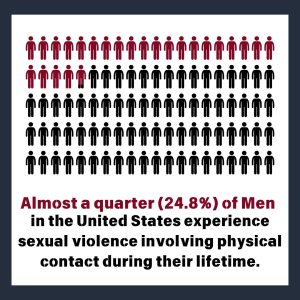

Every 68 seconds, a person is sexually assaulted in the United States. Devastatingly, one in five women in the United States experience rape or attempted rape during their lifetime. Almost a quarter (24.8%) of men in the United States experience sexual violence involving physical contact during their lifetime. Experiencing sexual assault or abuse can negatively impact a survivor’s physical health, quality of life, social functioning, job/school performance, and mental health. Survivors of sexual assault and abuse often suffer physical injuries, pain, significant emotional distress and serious mental health conditions including:
In one study, as many as 80% of teenage girls that had been sexually assaulted developed a mental health disorder (such as depression, anxiety or PTSD) and over half (55%) developed two or more mental health disorders.
Many survivors suffer additional mental anguish, stress and trauma as a result of the way institutional authorities (such as school administrators or employers) fail to appropriately respond to their report of experiencing sexual assault, abuse or discrimination. For example, a survivor may be retraumatized if a trusted authority does not believe what the survivor told them about the sexual assault or fails to take any action to help.
The impacts of sexual assault and abuse on survivors’ mental health are frequently very serious and can last the rest of their lives. Yet, the sad reality is that these lasting impacts often go ignored and untreated. Many survivors are even told to simply “get over it” or “toughen up,” when they actually deserve healthcare treatment and support for the significant mental health symptoms they experience. For example, a survivor of sexual assault experiencing PTSD may encounter the following long-term symptoms:
Although nothing can replace what you or your loved one lost as a result of sexual assault or abuse, you may be entitled to financial compensation. Experienced sexual assault, abuse and discrimination attorneys at The Collins Law Firm will fight for survivors like you or your loved one.
Sexual assault and sexual abuse include any sexual contact or behavior that occurs without the consent of the recipient. Any form of sexual assault or abuse may form the basis for a civil lawsuit, where our sexual abuse attorneys will help you. Some examples of specific types of sexual assault and abuse include:
Sexual assault, abuse and discrimination attorneys at The Collins Law Firm handle many types of civil sexual assault and sexual abuse cases including, for example, those that occur in the following settings:
These institutions, organizations and corporations may share responsibility for sexual assault and abuse and owe the survivor financial compensation.
Many survivors of sexual assault choose to participate in both a criminal sexual assault case and a civil sexual assault case. Criminal and civil sexual assault cases have different procedures with different potential outcomes, so it is important to consult with experienced attorneys, like those as The Collins Law Firm, to understand your options.
The main purpose of a criminal sexual assault case is to determine whether the perpetrator is guilty of a crime. In a criminal case, the government is the party that controls the case and is focused on punishing a perpetrator that has been found guilty with jail time, fines or probation. A criminal case typically does not result in any sort of financial compensation for the survivor. Sadly, the vast majority of survivors will not see their perpetrator go to jail—on average, out of 1,000 sexual assaults, 975 perpetrators will not go to jail or prison.
Fortunately, survivors can seek a different type of justice in the form of financial compensation by pursuing a civil lawsuit. The main purpose of a civil lawsuit is to obtain financial compensation for the physical, emotional, and economic harm experienced by the survivor as a result of the sexual assault and abuse. In a civil lawsuit, the survivor is the party that controls the case.
In a civil case, in addition to holding the perpetrator civilly liable for the sexual assault, a survivor may also sue institutions and corporations (such as a school or ride share service company) for their role in failing to prevent the sexual assault or failing to adequately respond to a report of sexual assault. For example, a nursing home may share responsibility for a sexual assault by failing to perform a background check on a dangerous employee or by failing to install appropriate security measures to protect residents from unwanted guests. Another example is where a school has notice that a student has a history of sexual misconduct but does nothing to protect other innocent students from additional sexual misconduct by that student.
Additionally, the burden of proof in a civil case is much less than in a criminal case. In a criminal case, the government’s burden of proof is to show that the perpetrator is guilty of sexual assault beyond a reasonable doubt. In a civil case, the survivor and her attorneys must only prove that it is more likely than not that the perpetrator is guilty of sexual assault.
MYTH #1: a survivor’s drinking or intoxication can be a justification for sexual assault.
False: using alcohol or drugs is never an excuse for sexual assault and does not mean that the survivor is at fault. When a survivor chooses to use drugs or alcohol, they are not choosing to be sexually assaulted. The blame for the sexual assault falls only on the perpetrator.
MYTH #2: sexual assault is typically perpetrated by a stranger.
False: survivors of sexual violence usually know the perpetrator. Approximately 80% of rapes are committed by someone known to the survivor. Of childhood sexual abuse cases reported to law enforcement, 93% of children (under the age of 18) knew the perpetrator. For example, the perpetrator is often a boyfriend, acquaintance, coach, classmate or coworker.
MYTH #3: the way an individual dresses can be a justification for sexual assault.
False: clothing is never an excuse for sexual assault or invitation for sexual activity. Wearing “provocative” clothing does not mean that a survivor has consented to sexual activity. The survivor is the only one allowed to make choices for their body. The blame for the sexual assault falls only on the perpetrator.
MYTH #4: to prove sexual assault, the survivor must physically fight back against the perpetrator, try to run or exhibit hysteria.
False: the way a survivor responds to the trauma of being sexually assaulted is unique to the survivor and the situation—there is no one way that a survivor is supposed to act during or after the sexual assault. While some survivors may experience a “fight or flight” response to being attacked, many survivors experience “freeze or fawn” responses. A “freeze” response occurs when, in anticipation of severe injury or death, the survivor’s body becomes immobile and renders the survivor unable to move, escape or call out during the sexual assault. A “fawn” response occurs when a survivor attempts to appease or please the perpetrator to avoid more severe harm and survive the attack.
Similarly, Hollywood often depicts survivors of sexual assault as being immediately distraught with lots of crying, sobbing and anger. In reality, a survivor’s mental and emotional responses to being sexually assaulted vary widely. Just because a survivor is quiet or silent does not mean she is not suffering severe mental and emotional distress.
MYTH #5: to prove sexual assault, the survivor must immediately report the assault to authorities.
False: survivors frequently wait to report sexual assault for a variety of reasons including fear of retaliation by the perpetrator, fear of having to repeatedly relive the experience when discussing it, feelings that law enforcement won’t do anything to help, worry about losing a job or because of trauma-related feelings of denial, embarrassment, shame and avoidance. For these and other reasons, only about 310 out of 1,000 sexual assaults are ever reported to the police.
The Collins Law Firm recognizes that sexual assault and abuse can be extremely difficult for survivors to discuss, and survivors have many legal options they might pursue in the aftermath of sexual assault and abuse. Our experienced, compassionate, and trauma-informed attorneys help survivors and their loved ones navigate a path forward, fight for justice and secure maximum financial compensation.
Rest assured that consultation with personal injury attorneys at The Collins Law Firm is completely confidential.
Moreover, you pay nothing unless you recover money, so there is nothing to lose. Call us at(630) 527-1595or fill out our contact form for your FREE CONSULTATION and let us start fighting to get you justice right away.
For help and resources:
"*" indicates required fields











Chris G. was very professional and helpful!